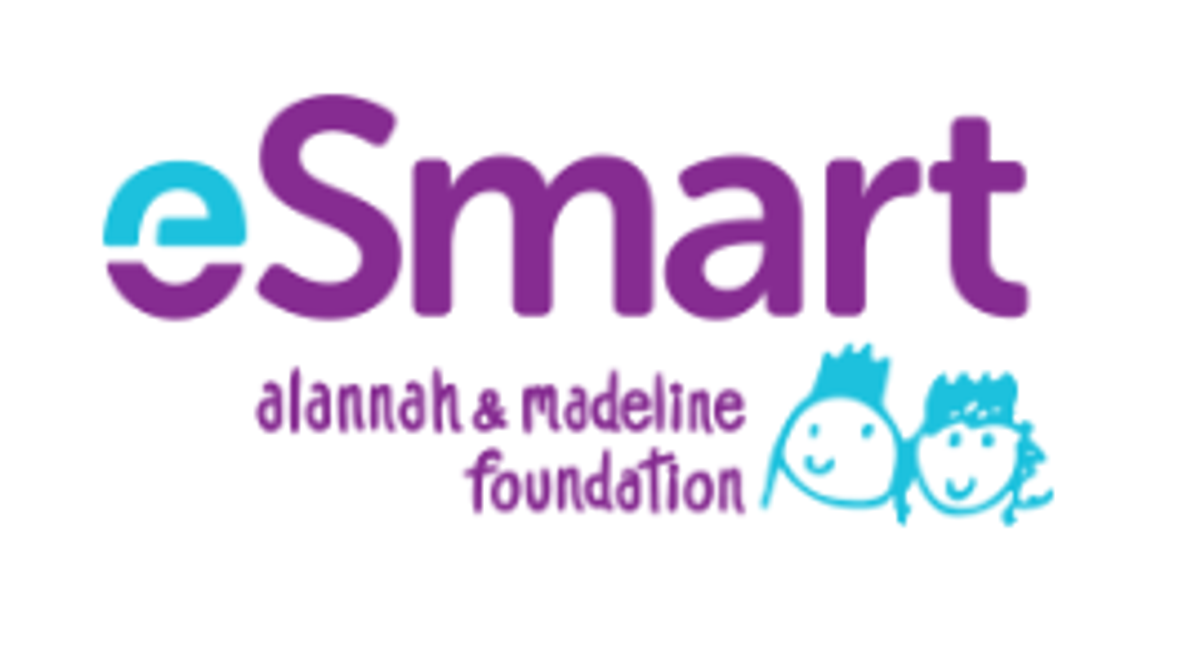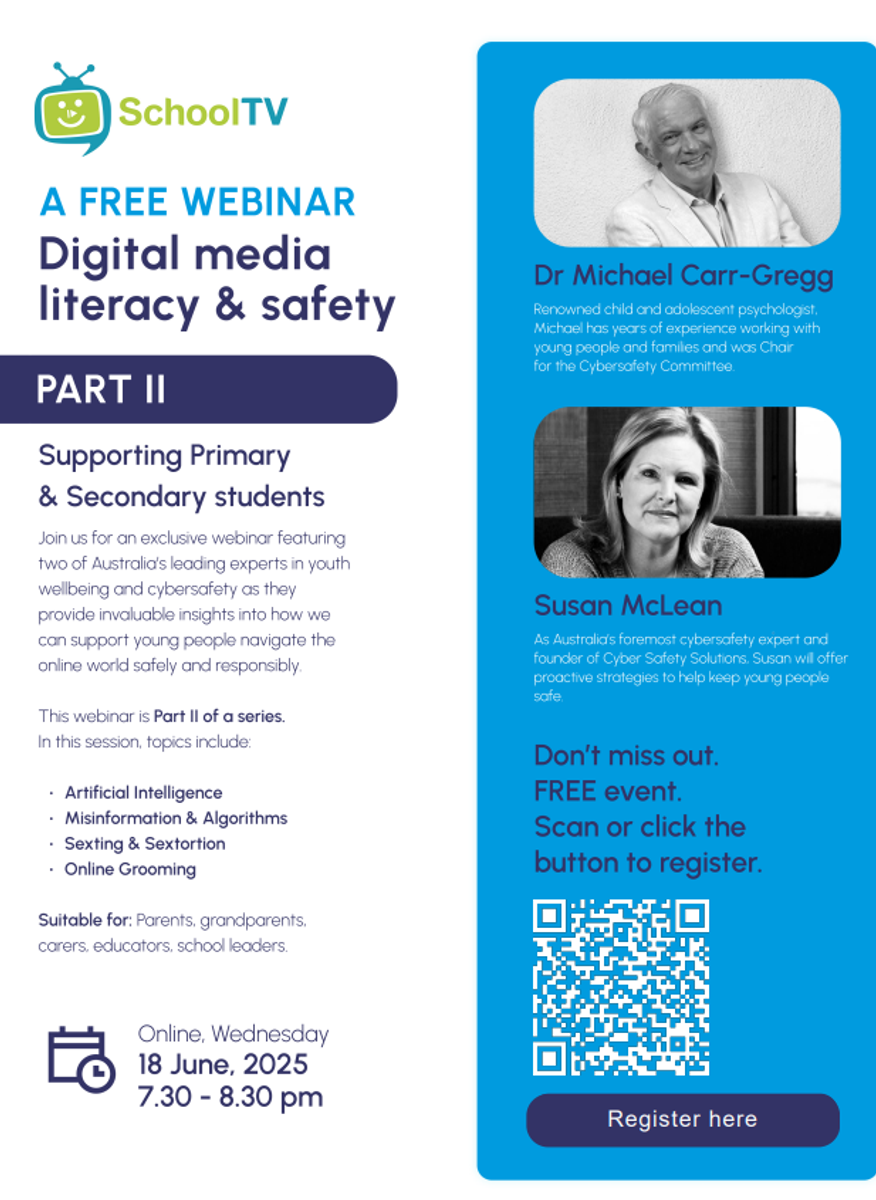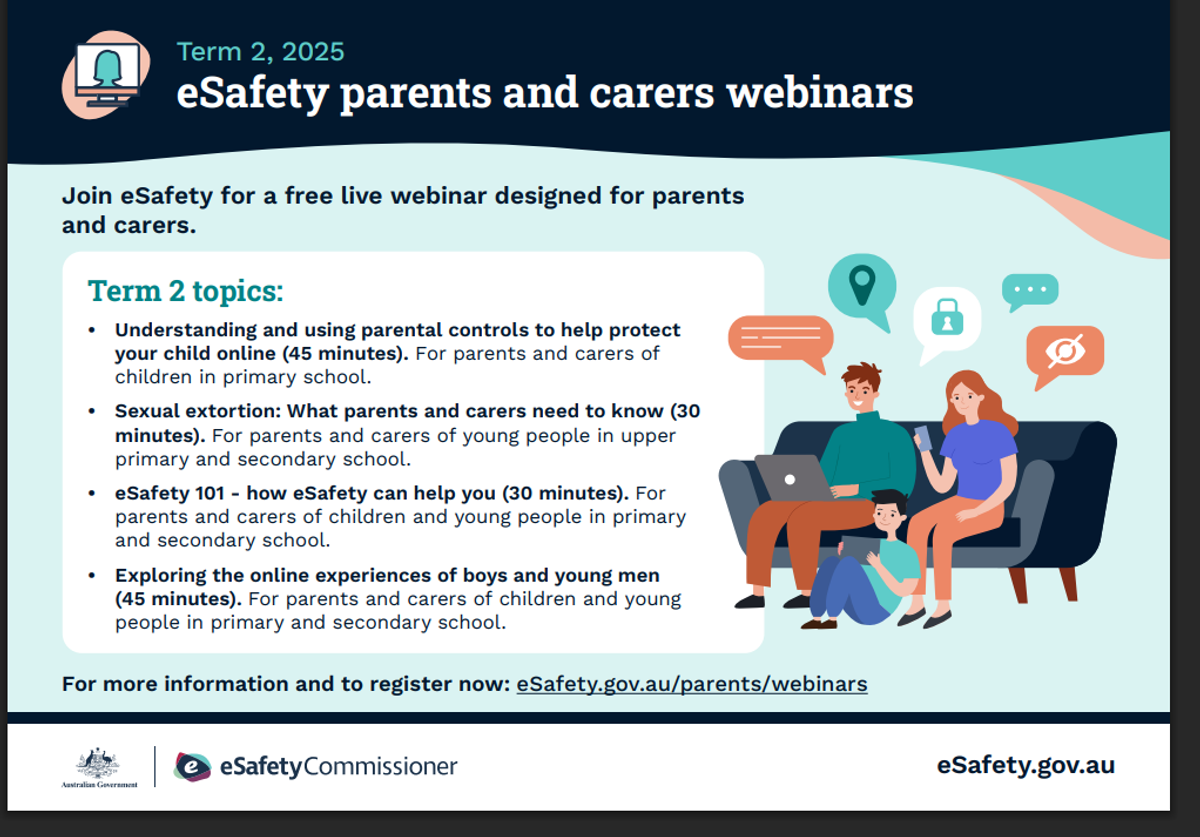eSmart and School Parent Resources

SchoolTV
Because parenting doesn’t come with instructions, SchoolTV is a wellbeing resource that can support you in the challenges relating to modern-day parenting.
This award-winning resource helps build relationships, foster connections, enable understanding and break down barriers to navigate a pathway towards better mental health and wellbeing for young people. It can assist in starting conversations on topics that are sometimes awkward or difficult to tackle.
St Laurence O'Toole Primary School subscribes to SchoolTV and anybody can access their invaluable resources via our website at www.stlleongatha.catholic.edu.au
________________________________________________________________________________
This Isn’t About One Child. It’s About All of Us.
The Guardian reported last week that an 11-year-old Australian girl was sexually abused after adding a stranger on Snapchat to increase her Snap Score. She was in a race with her best friend to hit 100,000 Snap points. It felt fun. Normal. Just part of how kids use the app. They added as many people as they could through Snapchat’s Quick Add feature because that’s how the score goes up. More friends. More streaks. More snaps.
To read the article, click below. https://www.theguardian.com/technology/2025
One of the people she added used that opening to cause serious harm.
Not because she was reckless. Because the platform made that kind of connection feel routine. Rewarded, even.
It’s tempting, as adults, to react with shock, then retreat to blame. Where were her parents? Why was she on Snapchat when she was only 11yrs old?
But those questions miss the point. She wasn’t doing something dangerous in secret. She was doing what the app made rewarding. Connecting. Interacting. Scoring points. She was playing the game, just as it was designed, and she lost in a way no child ever should.
This is not about failure. It is about environment.
Snapchat is not built for children. Its disappearing messages, gamified streaks, and public Snap Scores are not benign. They are behavioural nudges, crafted to deepen engagement. They reward repetition. They cultivate habit. And for young users, still developing judgment, still learning boundaries, that makes it fertile ground for manipulation.
No parent should be left to fight this alone. No child should be made to feel it was their fault for “making a bad choice” inside a digital environment that adults don’t even fully understand.
Bans matter not because they solve everything, but because they buy time, protect boundaries, and send a signal that child safety is not negotiable.
If a child is drawn to a feature that turns connection into currency, that doesn’t mean they are disobedient. It means they are human. Curious. Wired for belonging. And like all of us, they follow the reward.
What they need is not judgment. What they need is adults who know the system, can speak its language, and are equipped to walk beside them, not just warn from the shore.
It’s not too late to learn. But it is too urgent to wait. Let’s not waste this story trying to find someone to blame. Let’s make sure the next child doesn’t have to live it.
So what can parents do?
Stay close, not controlling.
Your child doesn’t need a spy. They need a translator. Someone who can help them make sense of the systems shaping their world, without fear, without shame. If your first instinct is to punish, pause. Ask instead: What did this app promise them? What reward were they chasing, and what does that tell you about their needs?
Talk about features, not just rules.
Many parents tell their kids “don’t talk to strangers online” but what does that mean when a platform like Snapchat literally encourages users to add people they don’t know? Children need to understand that not all strangers arrive looking scary. Some arrive through Quick Add. Some arrive looking like points.
Don’t hand over access to something you haven’t explored yourself.
You don’t need to become an expert, but you do need to become familiar. Know what Snap Scores are. Know what streaks are. Know how group chats, hidden messages and screenshot alerts work. If a feature is rewarding your child for keeping secrets, staying silent, or connecting without context that’s not a flaw. That’s the design.
Build digital habits early.
Safety is not something we bolt on after harm. It’s something we weave into the way kids learn to be online. Talk about manipulation the same way you talk about stranger danger in public spaces. Name the tricks. Call out the tactics. Teach them to trust their instincts and to come to you, no matter what.
Seek community, not perfection.
No one is doing this flawlessly. Not you. Not the school. Not the policy makers. The best thing you can do is stay informed, stay connected, and stay in conversation with your child, with other parents, with professionals who can help.
Because the goal here is not fear. It’s fluency.
Our children will still want to connect. To explore. That’s not wrong. It’s human. What they need is support, not suspicion. What they need is adults who understand the environment well enough to walk with them through it and recognise when something isn’t right.
You don’t have to do it alone. But you do have to start now.
Let’s make sure the next child isn’t left to figure this out on their own.
________________________________________________________________________________
Professional Development for the Adults Kids Trust Most
Children are growing up inside systems most adults were never trained to navigate. Harm doesn’t just happen in dark corners of the internet, it hides in plain sight. In features. In friend lists. In games that reward connection but never teach caution.
Online Safety Coach is year-round, embedded professional development built for educators, coaches, wellbeing staff, medical and allied healthcare professionals, Police and youth workers who don’t get to sit on the sidelines. It gives you the real-world digital fluency to recognise modern grooming tactics, unpack the risks baked into everyday platforms, and respond with confidence.
This is not about fear. It’s about equipping the adults kids already trust with the clarity, context, and confidence to keep them safer, sooner.
Because when the systems change, the safety strategies have to change too.
Talk to us about Online Safety Coach for your organisation.You don’t need to be a tech expert. You just need to be ready. Contact us today - hello@ctrlshft.global
Click below for more information.
https://www.safeonsocial.com/online-safety-coach
FREE WEBINAR
SchoolTV has a free webinar for families on Digital Media Literacy & Safety. This webinar will not be available to replay later, so we encourage you to register.
This exclusive, one-off event is fast approaching and we’d love to see your families benefit from the insights of two of Australia’s leading experts, Susan McLean and Dr Michael Carr-Gregg.
They will share invaluable insights on how to empower young people to navigate the online world safely and responsibly.
WEBINAR: Digital Media Literacy & Safety (Part II)DATE: Wednesday, 18 June 2025TIME: 7:30 pm
Topics in this webinar include:
- Artificial Intelligence
- Misinformation & Algorithms
- Sexting and Sextortion
- Online Grooming




